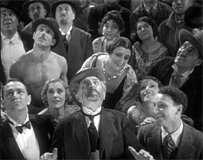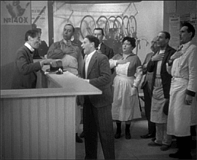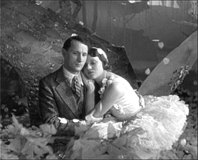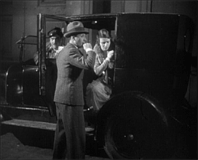Le Million (Rene Clair) 1931
 The often-asserted notion that movies should be regarded dominantly as a visual
medium has always irked me. I’m all for films that are capable of telling
their stories visually, but that some use sound to do so doesn’t make them
inferior, just different. The nostalgic idea that the silent film is somehow
purer than the sound seems to spring forth from this same erroneous mindset.
When Edison made the first modern movie camera, his intention was to use it in
junction with his earlier invention, the exceptionally popular phonograph. This
so-called visual medium was actually intended as a multimedia endeavor from the
get-go. It was only due to a lack of technology (and that lack of technology was
in the ability to project sound from a film, not in an ability to synchronize it
with a film) that the silent cinema was necessary at all. While there are
countless silent masterpieces, they probably should not be regarded as a purer
demonstration of the potential of the medium, but, instead, as examples of what
achievements are possible when working within technical limitations. It’s only
when advances in the realm of sound projection finally made the sound film a
possibility, the medium began to realize its full potential.
The often-asserted notion that movies should be regarded dominantly as a visual
medium has always irked me. I’m all for films that are capable of telling
their stories visually, but that some use sound to do so doesn’t make them
inferior, just different. The nostalgic idea that the silent film is somehow
purer than the sound seems to spring forth from this same erroneous mindset.
When Edison made the first modern movie camera, his intention was to use it in
junction with his earlier invention, the exceptionally popular phonograph. This
so-called visual medium was actually intended as a multimedia endeavor from the
get-go. It was only due to a lack of technology (and that lack of technology was
in the ability to project sound from a film, not in an ability to synchronize it
with a film) that the silent cinema was necessary at all. While there are
countless silent masterpieces, they probably should not be regarded as a purer
demonstration of the potential of the medium, but, instead, as examples of what
achievements are possible when working within technical limitations. It’s only
when advances in the realm of sound projection finally made the sound film a
possibility, the medium began to realize its full potential.
 Rene Clair’s charming musical comedy Le Million was technically his
first sound film (his previous Under the Roofs of Paris was shot silent,
then later dubbed into talkiedom) and its sophisticated use of the fledgling
technology led to universal acclaim for the director, who became regarded as the
first true master of the sound film. Considering that the first talkie feature
was made in 1928, there’s no doubt that Clair’s use of sound in Le
Million is incredibly sophisticated. The anachronistic sound effects that
comically comment upon the action and scenes in which the music comments upon
the action on screen seem incredibly innovative when compared to the other sound
films of the time. Instead of simply attempting to recreate the sounds heard in
the movie’s “reality”, Clair used his new tools as efficiently he did a
pan or a zoom to embellish our perceptions. Of course, much of what we see in Le Million has been
imitated so many times that the innovations seem obvious, but that matters
little, since there’s no denying that they feel like natural ways for Clair to
tell his delightful story.
Rene Clair’s charming musical comedy Le Million was technically his
first sound film (his previous Under the Roofs of Paris was shot silent,
then later dubbed into talkiedom) and its sophisticated use of the fledgling
technology led to universal acclaim for the director, who became regarded as the
first true master of the sound film. Considering that the first talkie feature
was made in 1928, there’s no doubt that Clair’s use of sound in Le
Million is incredibly sophisticated. The anachronistic sound effects that
comically comment upon the action and scenes in which the music comments upon
the action on screen seem incredibly innovative when compared to the other sound
films of the time. Instead of simply attempting to recreate the sounds heard in
the movie’s “reality”, Clair used his new tools as efficiently he did a
pan or a zoom to embellish our perceptions. Of course, much of what we see in Le Million has been
imitated so many times that the innovations seem obvious, but that matters
little, since there’s no denying that they feel like natural ways for Clair to
tell his delightful story.
 Le Million’s tale of a lost lottery ticket and the horde of
Parisians that attempt to track it down is filled with an effervescent grace.
The array of characters that Clair invents is utterly enchanting. The madcap
chase for the ticket extends across all tiers of French society, through a
bohemian apartment, a criminal hideout, a police station, and an opera house.
The ceaseless and ceaselessly inventive pursuit that powers the movie never
flags. Clair’s array of sight gags and coincidences feel far preferable to any
serious moral that he could impose upon this circus, and the closest that he
comes to one is to suggest that fate is a playful beast. Throughout, Le
Million remains lighter than a soufflé, somehow simultaneously leisurely
and rushed (probably due to the audience’s knowledge, courtesy of the
prologue, that everything will work out in the end), but that exceedingly
bearable lightness becomes the fuel for much of its charm.
Le Million’s tale of a lost lottery ticket and the horde of
Parisians that attempt to track it down is filled with an effervescent grace.
The array of characters that Clair invents is utterly enchanting. The madcap
chase for the ticket extends across all tiers of French society, through a
bohemian apartment, a criminal hideout, a police station, and an opera house.
The ceaseless and ceaselessly inventive pursuit that powers the movie never
flags. Clair’s array of sight gags and coincidences feel far preferable to any
serious moral that he could impose upon this circus, and the closest that he
comes to one is to suggest that fate is a playful beast. Throughout, Le
Million remains lighter than a soufflé, somehow simultaneously leisurely
and rushed (probably due to the audience’s knowledge, courtesy of the
prologue, that everything will work out in the end), but that exceedingly
bearable lightness becomes the fuel for much of its charm.
 There are those great films that lift us up to their levels
and those that make us realize the wonders of our own. Le Million is
definitely one of the latter, celebrating, as it does, the great diversity and
excitement that our lives can contain. There’s no pandering to be found here,
but instead, an invitation to see the world through the same rose colored tints
that Clair does. It might be tempting to write off a film like this, which is
solely interested in pleasing us as a mere trifle. To do so would be to demean
Clair’s consistently inspired savoir-faire and ability to provoke precisely
that pleasure, however. Upon viewing the film, it’s quite easy to see why its
arrival acted as a reproach to those who suggested the arrival of sound cinema
meant the death of film. Over
seventy years later, Le Million hasn’t lost a bit of luster.
There are those great films that lift us up to their levels
and those that make us realize the wonders of our own. Le Million is
definitely one of the latter, celebrating, as it does, the great diversity and
excitement that our lives can contain. There’s no pandering to be found here,
but instead, an invitation to see the world through the same rose colored tints
that Clair does. It might be tempting to write off a film like this, which is
solely interested in pleasing us as a mere trifle. To do so would be to demean
Clair’s consistently inspired savoir-faire and ability to provoke precisely
that pleasure, however. Upon viewing the film, it’s quite easy to see why its
arrival acted as a reproach to those who suggested the arrival of sound cinema
meant the death of film. Over
seventy years later, Le Million hasn’t lost a bit of luster.
* * * * Masterpiece
03-03-02
Jeremy Heilman